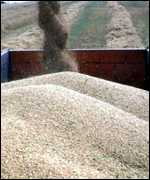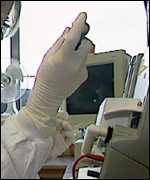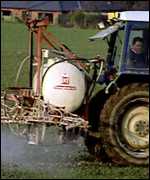
Tuesday, 18 May, 1999, 10:20 GMT 11:20 UK
GM food: Head to head
Point/Counterpoint
Transgenic food is big business
Controversy over genetically-modified (GM) food is reaching ever-greater heights.
We brought the two opposing sides of the GM argument together in a head-to-head confrontation.

|
Click on the questions below to see the views of manufacturers and ecologists on the issues surrounding GM food production.
- Do we need genetically-modified food?
- What are the effects on human health of eating it?
- Should GM crops be subjected to clinical trials?
- Some GM crops are designed to resist specific powerful pesticides. Will the use of these pesticides harm the environment?
- Will pollen from GM crops land on non-GM plants and create "superweeds"?
- Is it wise to directly manipulate genes - for example putting animal or bacterial genes into plants - rather than letting nature take its course?
- Isn't the whole exercise just a money-making ploy, designed to make farmers reliant on particular providers of seeds and pesticides?
Some supermarkets back GM foods
Some crops can be manufactured to produce their own insecticides
Specific genes can be taken from one species and transferred to another
Greenpeace says cross-pollination has already happened
Crops can be designed to resist herbicides
Strawberries can be made to resist frost damage - with the insertion of a gene from a cold-water fish
Do we need genetically-modified food?
Greenpeace: No - and in addition to not needing it, poll after poll shows that the public does not want it.
There are two arguments put forward saying we do need it - one is that we need GM food to feed the people of the world - the other is that it is the way forward for British and European agriculture.
The fact is that there is sufficient food in the world to feed everyone. It is poverty and inequality which leads to people not getting enough.
The production of GM food is motivated by profit. As far as agriculture in the UK and Europe goes, all the supposed benefits of GM foods are completely speculative, yet we know that it is scientifically, quantifiably proven that organic agriculture is healthier.

AgrEvo: Yes. To maintain a thriving countryside, natural biodiversity must be increased while allowing farmers to produce our food and remain in business to prevent a collapse of country life.
One way of achieving this without paying higher prices required for organic production is, along with traditional plant breeding, the adoption of GM technology.
The key benefits from this new technology are food security - there is a need to double food supply by 2025 due to population increases, changes in diets and natural disasters brought about by climate change. Less arable land will be available and there will be a need to destroy more primary habitat unless technology meets the challenge.
And environmentally, we can make agriculture more sustainable by lowering pesticide use and by increasing efficiency through producing higher yields. We need to produce more food on less land and do so in a more sustainable manner.
Back to top
What are the effects on human health of eating it?
Greenpeace: There is an enormous depth of scientific ignorance and uncertainty about what the immediate or long-term effects of placing GM foods into the food chain.
Time after time, the expert community has been proved to be wrong, and the public is fairly sceptical of its opinion.
Specific health concerns associated with GM foods have included the development of soya using a gene from Brazil nuts. The soya produced the allergic nut reaction. This was removed because developers knew to look for the allergy. But what about factors that are not even known, and not looked for?
Another aspect is antibiotic resistance. Some maizes were developed to contain antibacterial properties. If those were to be transferred to bacteria, they could become resistant to antibacterial drugs.

AgrEvo: No GM products are allowed into the food chain if there is any likelihood of harm to human health. All such products are, and have been, subjected to stringent regulation at both UK and pan-European levels. This mean that we can have even greater confidence in the safety of GM than non-GM food (non-GM foods are not subject to the same level of scrutiny).
Safety assessments of GM foods are quite different from those that were applied in the case of BSE, which has reduced the public's confidence in the regulatory process. With BSE, the assumption was that the public would not be exposed to the hazard.
With GM foods, it is assumed that the public will ultimately consume it and it is the consequences of exposure to them that are assessed so that these crops are only licensed if they are shown to be safe.
Back to top
Should GM crops be subject to clinical trials?
Greenpeace: At the moment, we seem only to be concerned with acute exposure to toxins - and we test pharmaceutical products.
But we only ingest a small amount of drugs in a lifetime - as opposed to tonnes of food.
AgrEvo: GM crops are already subject to stringent environmental regulations that are designed to ensure that no crop is licensed if it is likely to be of harm to the environment or to humans who come into contact with it.

It is the produce from the crop that would be consumed by humans that could be considered for clinical trials. However, it should be realised that GM crops are completely different from pharmaceuticals that are specifically designed to kill micro-organisms and/or directly affect parts of the human body.
GM crops are the same as non-GM crops except for one or two genes out of 50 - 70,000 genes already present in nature. For this reason, there is no justification for categorising them in the same way as highly active drugs.
This is also the opinion of the US Food and Drug Administration, one of the most stringent regulatory authorities in the world. However, GM crops are subjected, together with the food products in which they are contained, to international food safety assessments.
Back to top
Some GM crops are designed to resist specific powerful pesticides. Will the use of these pesticides harm the environment?
Greenpeace: Broad-spectrum herbicides kill every sort of weed that may grow in a field.
You would not usually be able to use these pesticides while your crops are growing, because it would kill them.
However, the patent on the herbicide Round Up is running out and manufacturers have developed a plant that is resistant to it.
The monetary gains for them are obvious. But in terms of wildlife, all other plants will be banished from the fields at all times of the year, and the animals which eat those plants and rely on them, will no longer be able to do so.
Fields will become even more of a desert than they already are. Another aspect is that crops which are engineered to be poisonous to some insects are being developed - but there have been reports from Canada which say that they are also killing lacewings - which themselves are predators.

AgrEvo: The use of the term "powerful pesticide" is misleading, as they have no more - and often less - of an effect on beneficial insects, wildlife and the wider environment than the older products they replace.
The perception that they are powerful arises from their ability to control a wider range of weeds and weed sizes.
However, the ones currently being developed (glufosinate ammonium and glyphosate) are biodegradable and do not persist in the soil. Furthermore, in those countries that have adopted these new crops, farmers and growers are reporting a reduction in the amount of pesticide being used. This clearly has major environmental benefits.
Back to top
"Will pollen from GM crops land on non-GM plants and create "superweeds"?
Greenpeace: We have already seen reports, again from Canada, that cross-pollination with remnants of non-GM crops has occurred.
There is also the problem that resistance to herbicides could transfer to weeds.
AgrEvo: Field studies have shown that plants with one or more new resistant genes are just as easy to control by chemical or cultural means as plants bred to be resistant to the specific weedkillers.

Some pollen will spread from GM crops but independent studies have shown that this only occurs at a very low level at distances greater than 10 metres.
But even if this does happen, what advantage will this plant have over the natural population? These plants will not be "superweeds", they are simply tolerant to one specific weedkiller and, if they need to be controlled, they will be susceptible to many other weedkillers and cultural methods designed to kill the weed.
This does not imply any increase in the use of weedkiller because these weeds still need to be controlled, whether or not a GM crop is being grown.
Back to top
Is it wise to directly manipulate genes - for example putting animal or bacterial genes into plants - rather than letting nature take its course?
Greenpeace: In terms of releasing GMOs into the food chain and the environment, the potential for unpredicted and adverse effects is enormous.
It is already known that when exotic species are released into an environment, the consequences can be disastrous. Rabbits in Australia was a disaster, as were certain types of fish introduced to Lake Victoria.
People thought there would not be a problem, but there was. That problem is exacerbated very much if we are dealing with a very unpredictable technology in the first place.
In some cases, you are not even dealing with gene transference from the same kingdom, let alone from the same species.

If you are dealing with any other sort of pollution, there is some mechanism for product recall. With chemical pollution, the substance will have some form of half-life, but here we are dealing with self-replicating, biological pollutants.
AgrEvo: Almost identical genes have been found in plants and in animals showing their commonplace inheritance during evolution and, in a few instances, implying that there are natural mechanisms that transfer genes between unrelated species.
The techniques used to transfer genes are often naturally occurring - Agrobacterium mediated transformation, for example, uses the ability of a soil bacterium to transfer some of its genes to plant roots that live alongside it.
The public needs to be assured that no human or animal genes have been used in any of the GM crops that are currently being commercially grown anywhere in the world.
While the use of genes may be part of a research project, any crops resulting from it would have to be approved before they could be grown by the stringent regulations already in place. The regulators consider ethical and safety issues relating to human health and the environment.
Back to top
Is not the whole exercise just a money-making ploy, designed to make farmers reliant on particular providers of seed and pesticides?
Greenpeace: There is a scientific fascination in the analysis of this technology - it offers fascinating experimental potential. But, this is being promoted by organisations that exist to generate money - not to feed the earth.
Their development of things like terminator technology, where seeds produce plants which do not themselves produce seeds, is purely in the interests of financial gain.
They are trying to get a monopoly on food. I do not think that this is a healthy trajectory for agriculture in the UK, let alone the rest of the world.
AgrEvo: This technology has the potential to improve the efficiency of agriculture and to allow sustainable food production into the 21st Century.
Development of this technology requires major investment and the companies who decide to become involved will need to get a return on their investment.
Its goal, to improve currently available food, is the same as that of the traditional, long-established techniques of crop breeding.
The major difference is the ability to overcome the inefficiencies of traditional cross breeding and selection. We now have the ability to move precise genetic characteristics from one species to another.
This will improve the quality of food produced and reduce the amount of chemicals used to protect these crops from weeds, pests and diseases. In practice, farmers will be no more reliant than they currently are on companies developing and selling new varieties.
Farmers will continue to have the choice to purchase non-GM varieties from a wide range of suppliers.
